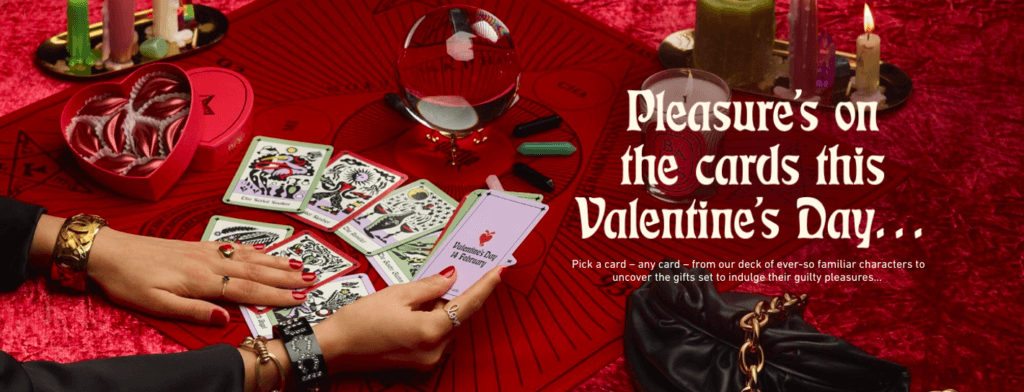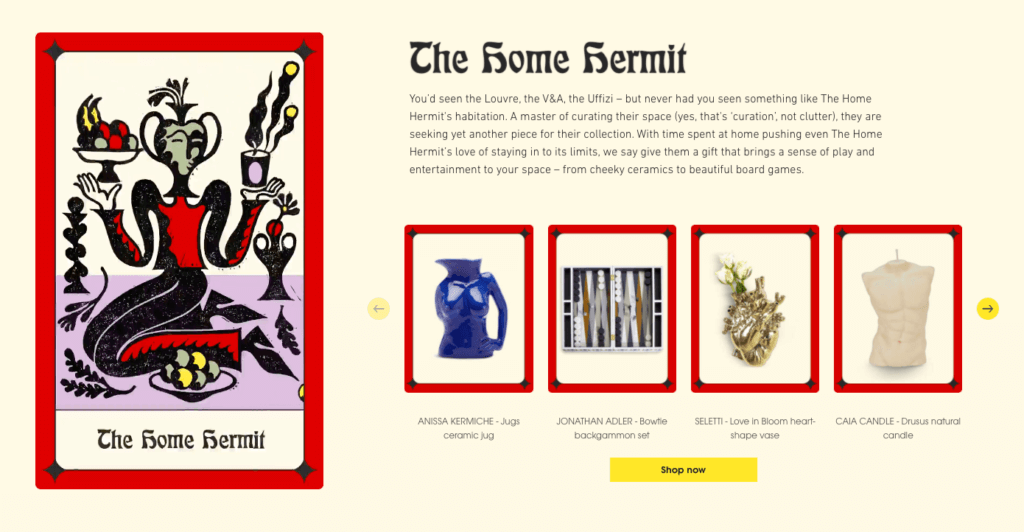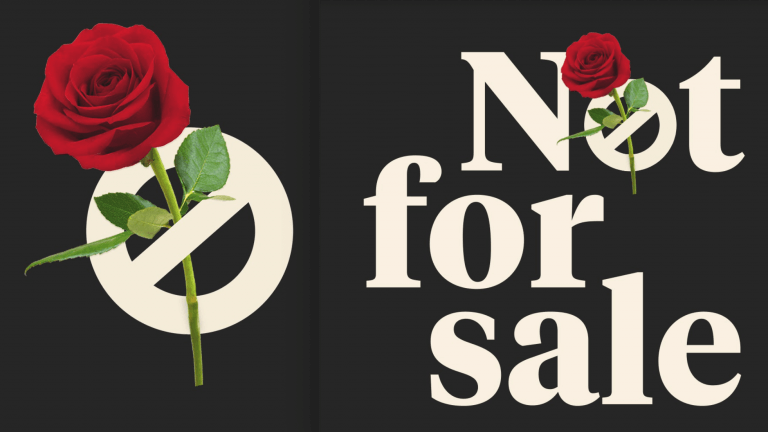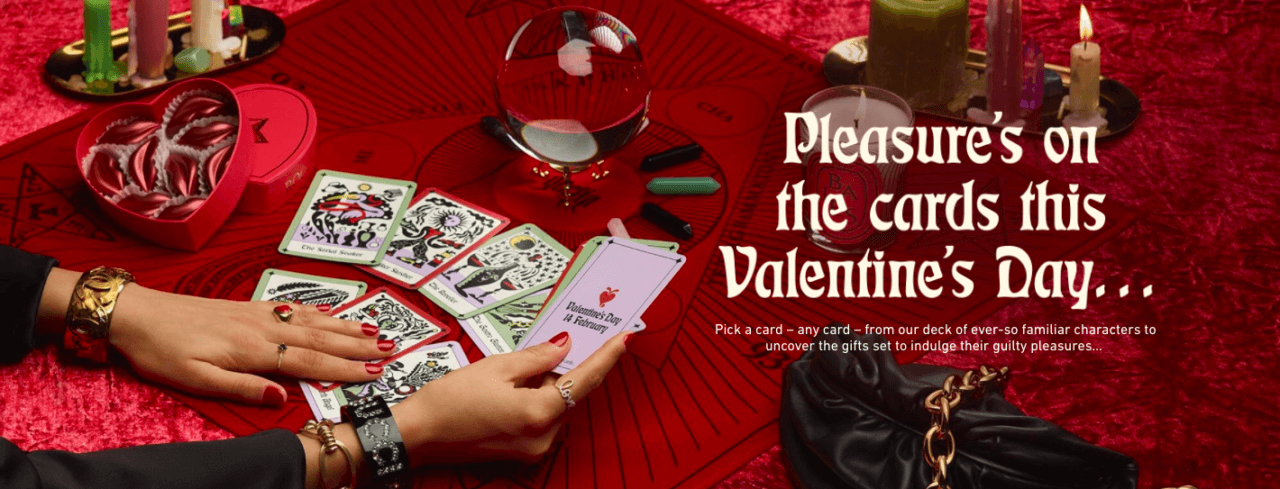Our Thoughts
The Power of Love How Selfridges Reimagined Valentine’s Day by Staying Culturally Relevant
As the eve of Saint Valentine’s Day approaches once again, supermarkets and online retail sites begin to bloom with the go-to (albeit hackneyed) symbols of love and romance: bright reds, pretty pinks, endless heart-shaped products, boxes of chocolates, red roses, cupids – and of course, the modern sexy staples of lingerie and pleasure toys.
One might say that the traditional semiotics of love and romance, used in the context of branding and retail, have become synonymous with vapid consumerism, monetised love, and superficial (often disingenuous) displays of successful coupledom. Even the backlash against Valentine’s Day has become commercialised and trite (see: Galentine’s Day – a day for ‘ladies celebrating ladies’).
This is not to say that brands and consumers should turn their backs on Saint Valentine’s Day. This is not a question of killing a century old tradition and cultural ritual. The question is – how can brands breathe new life into a clichéd holiday that has become seemingly devoid of meaning? How can brands make Valentine’s Day gift-buying an engaging, exciting and culturally relevant experience for consumers – not just a tick box exercise?
This year, Selfridges seem to be leading the way with an online campaign that demonstrates the value of keen cultural awareness. By keeping pace with emergent cultural trends and values, Selfridges has been able to reimagine Valentine’s Day in a distinct, relevant and refreshing manner. A quick look at the visuals, language and cultural themes invoked by the British retailer yields some important lessons for brands moving forward.

Selfridges 2021 Valentine’s Day Campaign
1. De-gendered Gifting
Segmenting their gifting guide through a series of tarot cards and personality concepts, Selfridges veers away from traditionally gendered and stereotypical ‘gifts for her’ and ‘gifts for him’ (see Debenhams, below).
 |
 |
From the ‘The Gastro Glutton’, to ‘The Home Hermit’ – Selfridge’s deck of ‘pleasure-seeking’ characters opens up the world of V-Day gift buying to friends, family and lovers alike. Products are no longer confined to the binaries of gender – and opportunities to celebrate a day of love are no longer restricted to those in a romantic relationship.

Selfridges’ ‘Pleasure Seekers’ Gift Guide, 2021
Each of the tarot card’s illustrations – lino-carved exclusively for Selfridges by illustrator Sophy Hollington – help to reinforce this pluralist approach to love and Valentine’s Day. With the depiction of genderless, phantasmagorical animals and surreal anthropomorphised objects, the tarot cards become a vacuum onto which any identity can be projected.
Altogether, Selfridges demonstrates a contemporary and culturally relevant interpretation of Valentine’s Day by avoiding the clichés of gender normative gifting practises (in notable contrast to Debenhams!).
2. Transcendental Love
Secondly, Selfridges injects new life into the conventional branded symbolism of Valentine’s Day by reframing it through the lens of the mystical. With visuals of candles, crystal balls, tarot cards and alchemical imagery throughout their online V-Day comms, Selfridges adds a touch of contemporary cultural relevance by tapping into the rising millenial interest in spirituality and astrology. In fact, Selfridges open up the holiday to new traditions by offering a range of online mystical experiences (e.g. Happy & Healthy Home Blessings, Dial-a-Psychic appointments and Earth-Angel Meditation sessions).

Mystical & Transcendental Love: Selfridges Online Valentine’s Day Events, 2021
These references to spirituality help to deepen our vision of love as something transcendental and all-encompassing – a mystical force beyond terrestrial understanding. Meditation experiences and home blessings invoke the idea of self-care, compassion and non-romantic forms of love (“send positive manifestations to our planet, release good vibrations and send out some universal love”). This is further amplified through linguistic references to diverse objects of affection (e.g. ‘friends’, ‘flatmates’, ‘self-love’), broadening our view of who and what can engender love.
In doing so, Selfridges successfully echoes a wider societal shift away from a superficial, one-dimensional interpretation of love as Eros (romantic passionate love), which dominates the mainstream in the usual Valentine’s Day focus on sex, lingerie and romance (just take a look at this years’ Poundland greeting cards!). Instead, they present a diverse, inclusive and pluralistic view of love that accounts for the multi-faceted Greek concepts of Philia (intimate, authentic friendship), Storge (unconditional, familial love), Philautia (self-love), and Agápe (empathetic, universal love).
3. Mindful Experiences
Finally, through providing a wide range of online events which require slow, thoughtful engagement (e.g. drawing classes, love letter-writing workshops, and guided bouquet arrangements), Selfridges promotes prolonged, shared experiences – in the place of short-lived, one-way exchanges.
This emphasis on experiences is reflected through the choice of products offered in the gift guide. While Valentine’s Day has usually been associated with conspicuous, materialistic and symbolic gifts (e.g. jewellery and red roses), Selfridge’s offer up a refreshing range of gifts that serve as conduits to shared and meaningful experiences (e.g. karaoke machines, Patagonia backpacks, backgammon sets).

Additionally, its segmented gift guide demands a deeper understanding and engagement with a giftee’s personality traits and interests (are they a ‘Magpie’ or ‘Earth Angel’?). This emphasis on meaningful gifting (rather than symbolic) is also evidenced in other emergent approaches to Valentine’s Day: this year, Bloom & Wild have ditched red roses in a bold effort to engender more thoughtful and imaginative gifting practises. As Charlotte Langley, brand and communciations director of Bloom & Wild suggests: “Valentine’s Day shouldn’t be about ticking a box with a generic dozen red roses, it should be about saying ‘I know you’ and showing you wildly care”.

Red Roses, Its Over: Bloom & Wild Valentine’s Day Campaign, 2021
Crucially, this taps into broader cultural changes in attitudes towards romance and dating: over the course of the pandemic, society has progressively been moving away from high-octane hook-up culture towards a new age of prolonged courtship. By responding to these wider societal shifts, Selfridges is successfully able to assert its cultural relevance, tapping into future-facing codes of love in a more resonant way.
3 Key Takeouts
- Keep pace with emergent trends and societal understandings of the occasions you are promoting. Keen cultural awareness is the key to ensuring relevance and distinction, allowing you to position your brand in a future-facing manner.
- When it comes to representing love and gifting rituals, push beyond the gender binary to allow for a more diverse and inclusive approach. Beyond Valentine’s Day, keep your finger on the pulse by taking a more pluralist approach to representations love.
- Reinvigorate clichéd holidays by borrowing from emergent trends in wider culture (e.g. Millenial Spirituality), allowing you to reimagine conventional, clichéd symbols in a creative, engaging and distinctive fashion.

